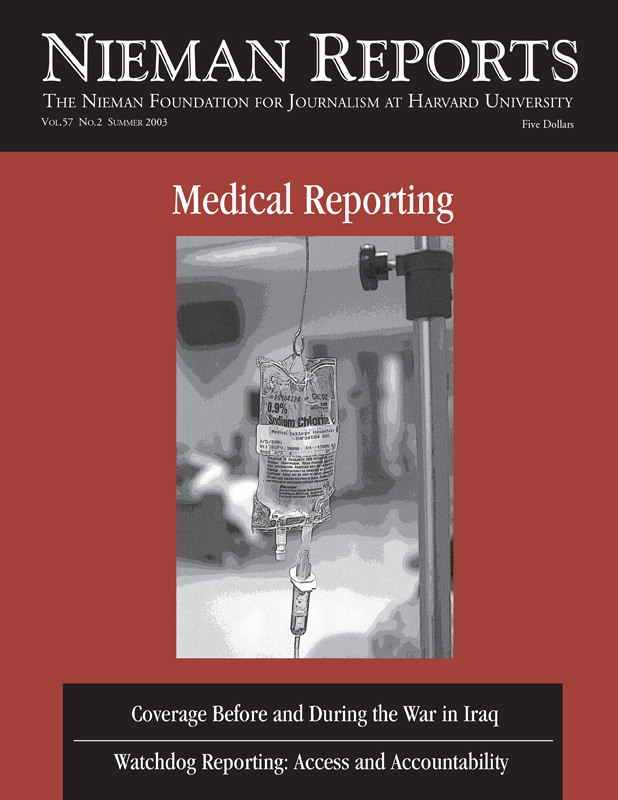
Medical Reporting
“The chasm between medical journalists and physicians appears mostly to be one of ignorance rather than conflicting interests or malice,” writes Terry L. Schraeder, who for 10 years worked as a medical journalist before entering medical school. Now doing her residency in internal medicine, she uses these experiences to highlight the problems between journalists and doctors and ways to close the widening gap of distrust. She is convinced that only when they “understand the other’s professional training, education, deadlines, responsibilities, codes of ethics, and internal stresses” will the chasm narrow. – Melissa Ludtke, Editor
I drink tea. A lot of it. Mug after mug. Day after day. Been drinking it since I was a kid. So I’ve been glad to hear tea may be good for us. But I’m teed off by stories that seem to have more holes than a sieve. Last September 24th, one such story caught my ear on the “CBS Evening News.” It said: “There are several new studies out tonight on the health benefits of tea, especially the green and black varieties that are rich in antioxidants. Researchers found drinking tea can reduce levels of bad cholesterol and help prevent heart disease and cancer.”
That’s it, 41 words. Most arresting is the assertion about what researchers found. Listen again. “Researchers found drinking tea can reduce levels of bad cholesterol and help prevent heart disease and cancer.”
Although we’ve been hearing for several years about possible benefits from drinking tea, hearing this made me wonder who conducted these “new studies.” And I wondered how much tea it would take to do me any good. And how often I’d have to drink it. What kind of tea: powdered, bottled, bagged or loose leaf? Which variety? Assam? Darjeeling? Oolong? Made with what kind of water? At what temperature? And brewed for how long? Taken with sugar? Lemon? Milk, cream or straight? Can tea help any viewer? Can it help me? If so, am I drinking enough?
Also, I wondered how the new studies supported, differed from, or advanced the stories we’ve been hearing for several years. So I poked around the Internet and LexisNexis, and I made some phone calls.
Tracking This Tea Story
Two hours before the CBS newscast, at 4:23 p.m., Reuters sent out a story based on a news conference held that day for the previous day’s Third International Scientific Symposium on Tea and Human Health, held in Washington, D.C. The gathering had been sponsored by the U.S. Department of Agriculture (USDA), the American Cancer Society, other scientific groups, as well as the Tea Council, representing the tea industry. The Reuters story began, “Solid evidence is mounting that drinking tea can prevent cell damage that leads to cancer, heart disease and perhaps other ills, scientists said on Tuesday.”
The story went on to say the Agriculture Department also released a study “suggesting” that tea drinking can reduce the risk of heart disease by lowering cholesterol. It reported that the USDA’s Human Nutrition Research Center in Beltsville, Maryland, had tested eight men and eight women who agreed to eat and drink for several weeks only what they were given at the lab. As a result, the director of the lab said, drinking tea had lowered their low-density lipoprotein (“bad” cholesterol) by up to 10 percent.
Although the script broadcast on CBS reported that researchers had found drinking tea can reduce “bad” cholesterol, here’s what readers learned in the Reuters story:
The study only “suggested” certain possible benefits.
RELATED ARTICLE
"Tips for Writing Medical News"Hardly the stuff of headlines, yet a news item on a network newscast is equivalent to a Page One story across the country. If an editor at CBS had asked the writer of the news script, “Can you give me one good reason we should broadcast this—only one?” or the anchor had asked the producer, the story might not have run.
Cautions in Some Original Reporting
The Reuters article also told of another report at the day-long symposium: A researcher at the University of Arizona and the Arizona Cancer Center said she had tested 140 smokers to see whether drinking tea could affect levels of chemicals associated with DNA damage. The trial looked at a chemical, 8-OhdG, which Reuters reported is found in urine and linked to damage of DNA. For four months, the volunteers drank water, black tea or green tea. At the trial’s end, the researcher said, her team found that those drinking only green tea underwent a 25 percent decrease in their 8-OhdG, an apparently favorable outcome.
The Reuters health and science correspondent, Maggie Fox, ended her 542-word article by cautioning, “Much more research [emphasis added] would be needed to see if lowering levels of 8-OhdG, or other markers of DNA damage, is actually associated with a lower risk of cancer.”
Another account of the symposium was even more cautious. Several hours before Reuters moved its article, the Tea Council wrote a press release distributed on the PR Newswire at 9 a.m. The release said circumspectly: “The results of a new clinical study suggest [emphasis added] that tea consumption may [emphasis added] decrease LDL [‘bad’] cholesterol by 10 percent when combined [emphasis added] with a ‘Step 1’ type diet, moderately low in fat and cholesterol, as described by the American Heart Association and the National Cholesterol Education Program (NCEP). The study, conducted at the USDA Beltsville Human Nutrition Research Center in Beltsville, Maryland, is the first investigation of tea in which the subjects’ diets were precisely controlled by having them eat meals prepared at the research facility.” (The then-acting director of the USDA Center, Joseph Judd, a research chemist, told me that that paragraph is “pretty accurate.”)
Although the Tea Council’s press release mentioned the special diet the participants followed, it didn’t bother with other details that would dilute the findings further: Only 16 people were in the trial and for only a few weeks. Sixteen people might have entered the trial, but the abstract of the study says 15 finished the first two three-week stints. And for the third and final phase of the trial, the number of participants slipped to 12. The abstract also acknowledges the role of Unilever, which Judd told me provided “the treatment beverages and partial financial support for the study.” He identified the “treatment beverages” as tea and placebos. Unilever makes Lipton tea.
Even when tea is accompanied by a healthful diet, the possible benefits may be limited. The Tea Council’s press release did not quote or paraphrase the key judgment in the abstract for the USDA study, “Based on this study, we conclude that black tea consumption as part of a[n] NCEP Step 1 type diet may reduce blood lipid risk factors for CVD [cardiovascular disease] in mildly hypercholesterolemic adults [emphasis added].” So they think tea—with a special diet—may help if your cholesterol is slightly high.
Creating a News Story
The network news writer had a tough assignment, even with the Reuters article about “solid evidence” that it said was “mounting.” He had to boil down all the information into copy that ran about 15 seconds.
Not long after I heard that script on the air, I spent some time with Ed Bliss, a former news writer for CBS correspondent Edward R. Murrow, editor for Walter Cronkite, and author of “Writing News for Broadcast.” I decided to conduct an experiment. I asked him to write a 15-second script based solely on the Reuters story. I didn’t tell him about the original broadcast script, nor did I mention my curiosity about it. Bliss probably figured I was up to something, but was too polite to ask. (Bliss died in late November at the age of 90.)
A few days later, he e-mailed his script and gave me permission to use it: “Drinking tea may be good for your health. Researchers have found evidence—no proof yet—that tea has ingredients that lower the risk of heart disease and cancer. This finding, announced today, is based on tests conducted by the University of Arizona and the Department of Agriculture.” (Forty-seven words; the network’s was 41.)
Bliss’s choice of words indicates that he’d realized the story was flimsy. The first verb he uses is “may.” And he stresses “no proof.” But in the news story that was broadcast, the script said the efficacy of tea was proved: “Researchers found drinking tea can reduce levels of bad cholesterol and help prevent heart disease and cancer.” Its lead sentence also contains problems. “Are … out tonight” is weaker than dormitory tea. Because “are” and other forms of “to be” don’t convey action or movement, listeners can’t tell whether the studies came out an hour ago, a week ago, or a month ago. Besides, hundreds of thousands of studies “are out tonight.” In fact, the studies mentioned in this broadcast script did not come out that night. And a few more problems: The script offers no clue about who conducted the studies or the name of the scientific body or journal that reported them.
If the assertions in the CBS script were true and newsworthy, it would have been better to write this lead: “Several new studies said today green and black tea may be good for you.”
Is there a lesson to be learned by following this tea trail? Yes: Don’t swallow everything you hear.
Mervin Block, a writing coach, is the author of “Writing Broadcast News—Shorter, Sharper, Stronger.” He was a staff writer on the “CBS Evening News with Walter Cronkite” and a staff writer on the “ABC Evening News with Frank Reynolds.” He also wrote for NBC News. His Web site is www.mervinblock.com.
That’s it, 41 words. Most arresting is the assertion about what researchers found. Listen again. “Researchers found drinking tea can reduce levels of bad cholesterol and help prevent heart disease and cancer.”
Although we’ve been hearing for several years about possible benefits from drinking tea, hearing this made me wonder who conducted these “new studies.” And I wondered how much tea it would take to do me any good. And how often I’d have to drink it. What kind of tea: powdered, bottled, bagged or loose leaf? Which variety? Assam? Darjeeling? Oolong? Made with what kind of water? At what temperature? And brewed for how long? Taken with sugar? Lemon? Milk, cream or straight? Can tea help any viewer? Can it help me? If so, am I drinking enough?
Also, I wondered how the new studies supported, differed from, or advanced the stories we’ve been hearing for several years. So I poked around the Internet and LexisNexis, and I made some phone calls.
Tracking This Tea Story
Two hours before the CBS newscast, at 4:23 p.m., Reuters sent out a story based on a news conference held that day for the previous day’s Third International Scientific Symposium on Tea and Human Health, held in Washington, D.C. The gathering had been sponsored by the U.S. Department of Agriculture (USDA), the American Cancer Society, other scientific groups, as well as the Tea Council, representing the tea industry. The Reuters story began, “Solid evidence is mounting that drinking tea can prevent cell damage that leads to cancer, heart disease and perhaps other ills, scientists said on Tuesday.”
The story went on to say the Agriculture Department also released a study “suggesting” that tea drinking can reduce the risk of heart disease by lowering cholesterol. It reported that the USDA’s Human Nutrition Research Center in Beltsville, Maryland, had tested eight men and eight women who agreed to eat and drink for several weeks only what they were given at the lab. As a result, the director of the lab said, drinking tea had lowered their low-density lipoprotein (“bad” cholesterol) by up to 10 percent.
Although the script broadcast on CBS reported that researchers had found drinking tea can reduce “bad” cholesterol, here’s what readers learned in the Reuters story:
- Only 16 people were studied.
- And for only a few weeks.
- They ate only a special diet.
- They experienced an average lowering of “bad” cholesterol by only up to 10 percent.
The study only “suggested” certain possible benefits.
RELATED ARTICLE
"Tips for Writing Medical News"Hardly the stuff of headlines, yet a news item on a network newscast is equivalent to a Page One story across the country. If an editor at CBS had asked the writer of the news script, “Can you give me one good reason we should broadcast this—only one?” or the anchor had asked the producer, the story might not have run.
Cautions in Some Original Reporting
The Reuters article also told of another report at the day-long symposium: A researcher at the University of Arizona and the Arizona Cancer Center said she had tested 140 smokers to see whether drinking tea could affect levels of chemicals associated with DNA damage. The trial looked at a chemical, 8-OhdG, which Reuters reported is found in urine and linked to damage of DNA. For four months, the volunteers drank water, black tea or green tea. At the trial’s end, the researcher said, her team found that those drinking only green tea underwent a 25 percent decrease in their 8-OhdG, an apparently favorable outcome.
The Reuters health and science correspondent, Maggie Fox, ended her 542-word article by cautioning, “Much more research [emphasis added] would be needed to see if lowering levels of 8-OhdG, or other markers of DNA damage, is actually associated with a lower risk of cancer.”
Another account of the symposium was even more cautious. Several hours before Reuters moved its article, the Tea Council wrote a press release distributed on the PR Newswire at 9 a.m. The release said circumspectly: “The results of a new clinical study suggest [emphasis added] that tea consumption may [emphasis added] decrease LDL [‘bad’] cholesterol by 10 percent when combined [emphasis added] with a ‘Step 1’ type diet, moderately low in fat and cholesterol, as described by the American Heart Association and the National Cholesterol Education Program (NCEP). The study, conducted at the USDA Beltsville Human Nutrition Research Center in Beltsville, Maryland, is the first investigation of tea in which the subjects’ diets were precisely controlled by having them eat meals prepared at the research facility.” (The then-acting director of the USDA Center, Joseph Judd, a research chemist, told me that that paragraph is “pretty accurate.”)
Although the Tea Council’s press release mentioned the special diet the participants followed, it didn’t bother with other details that would dilute the findings further: Only 16 people were in the trial and for only a few weeks. Sixteen people might have entered the trial, but the abstract of the study says 15 finished the first two three-week stints. And for the third and final phase of the trial, the number of participants slipped to 12. The abstract also acknowledges the role of Unilever, which Judd told me provided “the treatment beverages and partial financial support for the study.” He identified the “treatment beverages” as tea and placebos. Unilever makes Lipton tea.
Even when tea is accompanied by a healthful diet, the possible benefits may be limited. The Tea Council’s press release did not quote or paraphrase the key judgment in the abstract for the USDA study, “Based on this study, we conclude that black tea consumption as part of a[n] NCEP Step 1 type diet may reduce blood lipid risk factors for CVD [cardiovascular disease] in mildly hypercholesterolemic adults [emphasis added].” So they think tea—with a special diet—may help if your cholesterol is slightly high.
Creating a News Story
The network news writer had a tough assignment, even with the Reuters article about “solid evidence” that it said was “mounting.” He had to boil down all the information into copy that ran about 15 seconds.
Not long after I heard that script on the air, I spent some time with Ed Bliss, a former news writer for CBS correspondent Edward R. Murrow, editor for Walter Cronkite, and author of “Writing News for Broadcast.” I decided to conduct an experiment. I asked him to write a 15-second script based solely on the Reuters story. I didn’t tell him about the original broadcast script, nor did I mention my curiosity about it. Bliss probably figured I was up to something, but was too polite to ask. (Bliss died in late November at the age of 90.)
A few days later, he e-mailed his script and gave me permission to use it: “Drinking tea may be good for your health. Researchers have found evidence—no proof yet—that tea has ingredients that lower the risk of heart disease and cancer. This finding, announced today, is based on tests conducted by the University of Arizona and the Department of Agriculture.” (Forty-seven words; the network’s was 41.)
Bliss’s choice of words indicates that he’d realized the story was flimsy. The first verb he uses is “may.” And he stresses “no proof.” But in the news story that was broadcast, the script said the efficacy of tea was proved: “Researchers found drinking tea can reduce levels of bad cholesterol and help prevent heart disease and cancer.” Its lead sentence also contains problems. “Are … out tonight” is weaker than dormitory tea. Because “are” and other forms of “to be” don’t convey action or movement, listeners can’t tell whether the studies came out an hour ago, a week ago, or a month ago. Besides, hundreds of thousands of studies “are out tonight.” In fact, the studies mentioned in this broadcast script did not come out that night. And a few more problems: The script offers no clue about who conducted the studies or the name of the scientific body or journal that reported them.
If the assertions in the CBS script were true and newsworthy, it would have been better to write this lead: “Several new studies said today green and black tea may be good for you.”
Is there a lesson to be learned by following this tea trail? Yes: Don’t swallow everything you hear.
Mervin Block, a writing coach, is the author of “Writing Broadcast News—Shorter, Sharper, Stronger.” He was a staff writer on the “CBS Evening News with Walter Cronkite” and a staff writer on the “ABC Evening News with Frank Reynolds.” He also wrote for NBC News. His Web site is www.mervinblock.com.


